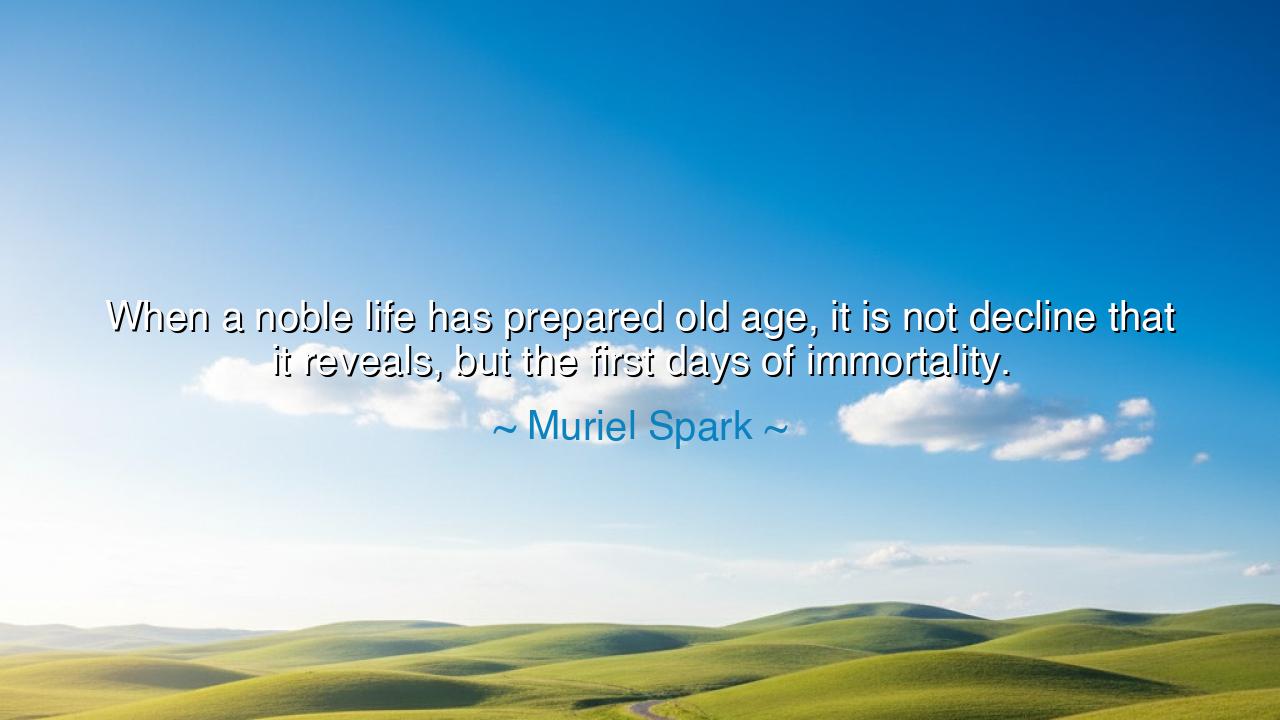
When a noble life has prepared old age, it is not decline that it
When a noble life has prepared old age, it is not decline that it reveals, but the first days of immortality.






Listen, O children of wisdom, to the words of Muriel Spark, for in them lies a truth that transcends time and touches the very essence of life’s journey: “When a noble life has prepared old age, it is not decline that it reveals, but the first days of immortality.” These words speak of the path that a soul takes over a lifetime—a path not of decay or despair, but of preparation for the ultimate transcendence. For those who live with purpose, who embody virtue throughout their years, the later stages of life are not the closing of a chapter, but the beginning of something greater—a glimpse of immortality, where the soul, unburdened by the body, continues its journey into the eternal.
In the ancient world, the concept of immortality was not seen in the literal sense, but as the continuation of the spirit through wisdom, virtue, and legacy. The Greeks, especially in the teachings of Socrates and Plato, understood that the true immortality of a person was found not in the body, but in the lasting impact of their ideas and actions. Socrates, facing the end of his life, did not lament the physical decline of his body, but instead embraced the idea that his soul would live on through the ideas he had shared and the wisdom he had imparted to others. To Socrates, immortality was not a reward for surviving long years, but a consequence of living a life filled with nobility and purpose. His was a life well-prepared for the days of old age, and it was through his teachings that he became immortal, his ideas living on far beyond his time.
The Romans too understood this principle. Cicero, the great orator and statesman, spent his life in service to the Republic, striving for justice, virtue, and the well-being of the people. As he grew older, his body weakened, but his mind and spirit remained undiminished. In his later years, Cicero dedicated himself to the work of writing and reflection, ensuring that his legacy would endure. His writings, filled with wisdom on topics of duty, morality, and statesmanship, became his form of immortality. Even as Cicero’s life approached its end, he continued to contribute to the world, knowing that his noble life had prepared him for old age not as a decline, but as a new beginning—the first days of immortality, where his soul, through his works, would continue to inspire and guide future generations.
This idea of immortality through legacy is echoed in the life of Leonardo da Vinci, whose contributions to art and science continue to influence the world long after his death. Though Leonardo’s body was frail in his later years, his mind remained vibrant, filled with a relentless pursuit of knowledge. His notebooks, filled with sketches, inventions, and observations, continue to serve as a testament to his immortal genius. Da Vinci’s life was one of nobility, in the sense that he lived not for wealth or fame, but for the advancement of human understanding. His works are his immortality, and as he grew older, he did not see his age as a burden, but as the fulfillment of a life well-lived. To Leonardo, old age was the beginning of the true immortality that comes from creativity, learning, and giving to the world.
Muriel Spark’s words remind us that the noble life, one lived with purpose and integrity, prepares us for the inevitable end, not as a decline, but as a continuation into something greater. Old age, when the soul is prepared, does not have to be feared. Instead, it is a time to reflect on the legacy we have built and to continue contributing to the world in ways that transcend the physical. As we grow older, we do not have to fade away; we can shine even brighter, for the wisdom we have gained and the good we have done in our lives radiate beyond our years.
The lesson here is clear: to live a noble life is to prepare for old age not with dread, but with confidence. When you dedicate your life to virtue, to the service of others, and to the pursuit of truth, you are laying the groundwork for an immortal legacy. The true value of life is not in how many years we live, but in the depth and purpose with which we live those years. The first days of immortality do not come at the moment of death, but in the way we live our lives—in the impact we have, in the wisdom we impart, and in the good we do for the world.
In your own life, strive to live with nobility and purpose. Dedicate yourself to growth, to service, and to living with integrity, so that when the years of old age come, you may greet them not with sorrow, but with the joy of knowing that your life has been a preparation for the eternal. Let your wisdom and your actions outlive your body, becoming the immortal legacy that will continue to inspire and guide those who follow. When the time comes, you will not see the end of your life as a decline, but as the first days of immortality, where your spirit, your contributions, and your love will continue to shape the world long after you are gone.






AAdministratorAdministrator
Welcome, honored guests. Please leave a comment, we will respond soon